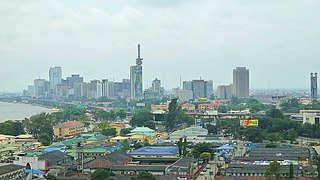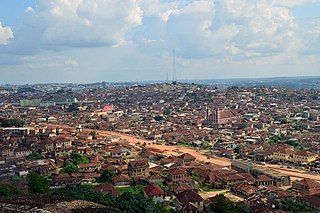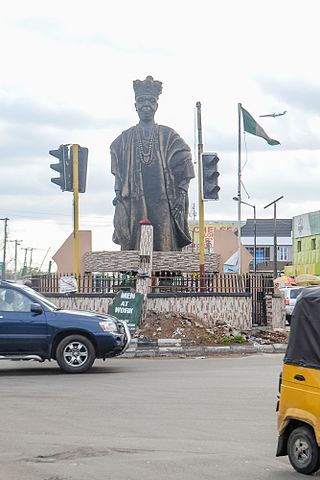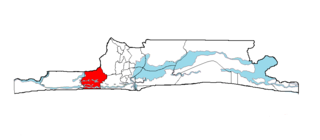Related Research Articles

Lagos, or Lagos City, is a large metropolitan city in southwestern Nigeria. With an upper population estimate of 21 million, it is the largest city in Nigeria, and the most populous urban area on the African continent. Lagos was the national capital of Nigeria until the government's December 1991 decision to move their capital to Abuja in the centre of the country. Lagos is a major African financial centre and is the economic hub of Lagos State and Nigeria at large. The city has a significant influence on commerce, entertainment, technology, education, politics, tourism, art, and fashion in Africa. Lagos is also among the top ten of the world's fastest-growing cities and urban areas. A megacity, it has the fourth-highest GDP in Africa, and houses one of the largest and busiest seaports on the continent. Due to the large urban population and port traffic volumes, Lagos is classified as a Medium-Port Megacity.

Lagos State is a state in southwestern Nigeria. Of the 36 Nigerian states, it is the second most populous state but the smallest in area. Bounded to the south by the Bight of Benin and to the west by the international border with Benin for 10 km, Lagos State borders Ogun State to the north for about 283 km, making it the only Nigerian state to border only one other state. Named for the city of Lagos—the most populous city in Africa—the state was formed from the Western Region and the former Federal Capital Territory on 27 May 1967.
Ota is a town in Ogun State, Nigeria with an estimated 163,783 residents. Ota is the capital of the Ado–Odo/Ota Local Government Area. The traditional leader of Ota is the Olota of Ota, Oba Adeyemi AbdulKabir Obalanlege. Historically, Ota is the capital of the Awori Yoruba tribe.

Ogun State is a state in southwestern Nigeria. As a Nigerian state, Ogun is the second most industrialised state after Lagos, with a focus on metal processing. It has good road and rail connections to the harbours in Lagos and Lekki. Wole Soyinka, winner of the Nobel Prize for Literature 1986, lives in Ogun.

Ekiti State University Ado Ekiti is a state government owned and operated Nigerian university, located in Ado Ekiti, Ekiti State, Nigeria. It was established as Obafemi Awolowo University, Ado-Ekiti on 30 March 1982 by the administration of Chief Michael Adekunle Ajasin, the first civilian governor of Ondo State. The university is a member of the Association of Commonwealth Universities.

Badagry Division is an administrative division of Lagos State in Nigeria.

Amuwo-Odofin is a local government area (LGA) in the Badagry Division, Lagos State, Nigeria.

The Awori is a subgroup of the Yoruba people speaking a dialect of the Yoruba language. The Awori people are the original inhabitants of Lagos State and some parts of Ogun State, namely Ado-Odo/Ota Local Government Area of Ogun State. The Awori people are landowners, farmers and fishermen.
Sarah Adebisi Sosan is a Nigerian politician and former teacher, she served as deputy governor of Lagos State from 2007 to 2011.

Agege is an ancient town and local government area in the Ikeja Division of Lagos State, Nigeria. Until 1927, Agege was the capital of Ikeja Division.

Surulere is a local government area located on the mainland in Lagos State, Nigeria. It has an area of 23 km2 (8.9 sq mi). At the 2006 census, there were 503,975 inhabitants, with a population density of 21,864 inhabitants per square kilometer. The local government area is bordered by Yaba, Mushin and Ebute-Metta.

Oto-Awori previously known as just "OTO" is a suburban community and a local government development council area located along the Lagos-Badagry Expressway in Ojo local government area of Lagos State. Oto Awori was founded by Ayato which is the predecessor for today's Esau Oladega AINA (Kuyamiku) of the Oloja Ruling House of Oto Awori. Ayato the founder of Oto Awori from Ile-Ife, Oto Awori has been administered from Badagry since 1909 having apparently been placed for a few years in the Lagos District by the definition of boundaries thereof 1985.

Adeniran Ogunsanya College of Education, also known as AOCOED, is a higher education institute located in Oto-Awori community in the Oto-Awori area of Ojo, Lagos State. Adeniran Ogunsanya College of Education offers the award of Nigeria Certificate in Education (NCE) and undergraduate first degree courses in Education, having affiliated to Ekiti State University.

Ojo is a town and local government area in Lagos State, Nigeria, with a few notable locations such as Lagos State University and the Alaba International Market as well as others. Ojo is located on the eastern section of the Trans–West African Coastal Highway, about 37 km west of Lagos. It is a part of the Lagos Metropolitan Area.
Omoba Yinka Mursiq Durosinmi is a Nigerian politician and former Chairman of Ojo local government area of Lagos State.
The Territories of the Awori are a part of Nigeria inhabited by the Awori tribe sub-ethnic group of the Yoruba people, speaking a distinct dialect of the Yoruba language. Traditionally, Awori are found in two Nigerian States: Ogun and Lagos.
Iju also known as Iju Oloko [idʒou ɔ:lɔkɔ], is a Nigerian town located in southern Ogun state and about 18 kilometers from Lagos state, a major commercial hub in West Africa. The town is inhabited mostly by Egba/Owu natives whose ancestors settled there between 1842 and 1845.

Lucky Orimisan Aiyedatiwa is a Nigerian businessman and politician who has served as governor of Ondo State since 2023. He previously served as deputy governor of Ondo State from 2021 to 2023 under Governor Rotimi Akeredolu. He is a former commissioner of Niger Delta Development Commission.
Chief Theophilus Olabode Avoseh, known as T. Ola Avoseh, was a local historian, writer and chief of Badagry, Lagos. He wrote several booklets and pamphlets in the English and Yoruba languages on aspects of the history and culture of Badagry and Epe towns in Lagos, Nigeria.

Basil Chukwuemeka Ezeanolue is a Nigerian professor of Otolaryngology. He was a member of senate and he is a fellow of the National Postgraduate Medical College of Nigeria, fellow of the West African College of Surgeons in the Faculty of Otorhinolaryngology, and Fellow of the American Academy of Otolaryngology Head and Neck Surgery. Basil Ezeanolue was, at several times, the Head of Department of Otolaryngology at the Faculty of Medical Sciences, University of Nigeria, Ituku Ozalla, Enugu, and Dean, Faculty of Medical Sciences, University of Nigeria. Basil Ezeanolue was the Secretary and later President of the Otorhinolaryngological Society of Nigeria. He delivered the 82nd Inaugural Lecture of the University of Nigeria, at Enugu Nigeria, entitled, "Hear the Voice" on 17 July 2014. It was also the first inaugural lecture coming from the Department of Otolaryngology of the University of Nigeria. Ezeanolue also delivered the 6th Valedictory Lecture of the University of Nigeria entitled, "Challenges of balancing work with life, Geriatric Otorhinolaryngology and living post-work life of retirement - A discourse of the experiences and the lessons learnt from the Nigeria University System and Health Services Sectors perspectives of an Academic Clinical Otorhinolaryngologist Head and Neck Surgeon" on 10 November 2023. He is the Founder and Surgeon-in-Chief of Balsam Clinics, Enugu, Nigeria. He was also a member of the Chukwuemeka Odumegwu Ojukwu Teaching Hospital Governing Board, Awka,, Anambra State. On 20 September 2018, he delivered the 36th Convocation Lecture of the National Postgraduate Medical College of Nigeria, entitled, "Do Not Be Afraid And Do Not Fail To Rescue – a discourse on the challenges confronting Nigeria Health Sector" at Ijanikin, Lagos. Basil Ezeanolue's publications have been cited 440 times according to the AD Scientific index ranking. and 443 times according to the google scholar index.
References
- ↑ Ruhollah Ajibọla Salakọ (1998). Ọta: Biography of the Foremost Awori Town. Penink Publicity & Company.
- ↑ E. A. Ajayi; R. O. Ajetunmobi; Akindele S. A. (1998). A History of the Awori of Lagos State. Adeniran Ogunsanya College of Education. ISBN 978-978-142-035-1.
- ↑ A. G. A. Ladigbolu (prince.) (2007). Nigerian at 47, 1960-2007: prominent achievers in Nigeria. Lichfield Communications. ISBN 978-978-30498-0-2.
- ↑ Lagos State (Nigeria). Ministry of Information and Culture. Public Information Dept (1991). Focus on [name of Administrative Division]: Badagry. The Dept.